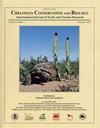印度北部昌巴尔河红冠龟(Batagur kachuga)和三条纹龟(Batagur dhongoka)繁殖量的差异
IF 0.8
4区 生物学
Q3 ZOOLOGY
引用次数: 5
摘要
摘要描述生殖产出的变化是理解人口统计学和确定管理策略的基础。当感兴趣的物种面临灭绝威胁时,这样做至关重要。红冠顶龟(Batagur kachuga)和三条纹顶龟(巴塔古尔dhongoka)受到过度捕捞和栖息地丧失的严重威胁。尽管它们处于濒危状态,但很少有发表的关于物种生态学和生命史的研究能够有效地进行保护;现有的3项已发表的研究是在近30年前完成的。我们在此提供了北印度Chambal河中这些海龟繁殖产量变化的信息。将广义线性模型和方差分析与巢密度、繁殖力和卵量数据进行拟合。在4年的时间里,鸟巢的数量在3个季节(2007年、2008年和2010年)总体上呈下降趋势,每个筑巢季节中期观察到的鸟巢数量最多。筑巢活动高峰可能发生在最低的河流深度或筑巢栖息地的最大可用性。观察到的巢穴数量下降可能与筑巢群体的减少或合适的筑巢栖息地的地理变化或食物资源可用性和/或获取的变化有关,从而导致雌性筑巢减少。卡丘加B.kachuga的巢穴数量与前一年的总降水量呈显著负相关。据推测,总降水量可能会影响可用的筑巢栖息地数量或其他限制性资源的可用性。这两个物种的繁殖产量随繁殖力而非卵子体积的变化而变化,这意味着成熟发生在体型较大的情况下,卵子体积不受限制,这需要相对较长的世代时间。离合器大小的变化可能与资源获取模式的变化有关,尽管总降水量并不是一个合适的指标。在这项研究中,生殖力作为体型函数的潜在变化没有被考虑在内。这项研究证实了之前的发现,即卡丘加B.kachuga比dhongoka产的蛋更大、更少。这些结果有助于了解这些记录不足的海龟物种的生活史,并为保护行动提供信息。未来在更大的空间范围内进行的研究需要表征筑巢地点和巢穴地点的保真度,并纳入雌性个体的数据。本文章由计算机程序翻译,如有差异,请以英文原文为准。
Variation in Reproductive Output of the Red-crowned Roofed Turtle (Batagur kachuga) and the Three-striped Roofed Turtle (Batagur dhongoka) in the Chambal River of North India
Abstract Characterizing variation in reproductive output is foundational to understanding the demography of a population and determining management strategies. Doing so is paramount when the species of interest is threatened with extinction. The red-crowned roofed turtle (Batagur kachuga) and the three-striped roofed turtle (Batagur dhongoka) are severely threatened by overharvesting and habitat loss. Despite their imperiled status, there are very few published studies on species ecology and life history to enable effective conservation; the 3 published studies that are available were completed nearly 3 decades ago. We herein provide information on variation in reproductive output for these turtles in the Chambal River of North India. Generalized linear models and analyses of variance were fitted to data on nesting density, fecundity, and egg volume. The number of nests showed an overall decline across 3 seasons (2007, 2008, and 2010) over a 4-yr duration with the highest number of nests observed in the middle of each nesting season. Peak nesting activity potentially occurs at lowest river depth or maximum availability of nesting habitat. The observed decline in the number of nests could be related to a decline in the nesting cohort or a geographic shift in suitable nesting habitat or changes in food resource availability and/or acquisition, leading to fewer females nesting. The number of nests in B. kachuga were significantly negatively correlated with total precipitation in the immediately preceding year. Presumably, total precipitation may affect the amount of nesting habitat available or availability of some other limiting resource. Reproductive output in both species varied as a function of fecundity rather than egg volume, implying that maturity occurs at larger body sizes for egg volume to be unconstrained, which would require relatively long generation times. Variation in clutch size could be tied to variable resource acquisition patterns, although total precipitation was not found to be an appropriate proxy. Potential variation in fecundity as a function of body size was not accounted for in the study. The study corroborated previous findings that B. kachuga lays larger and fewer eggs than B. dhongoka. These results contribute to understanding the life history of these poorly documented turtle species and toward informing conservation actions. Future studies over a larger spatial extent need to characterize nesting sites and nest-site fidelity and incorporate data from individual females.
求助全文
通过发布文献求助,成功后即可免费获取论文全文。
去求助
来源期刊
CiteScore
1.70
自引率
14.30%
发文量
17
审稿时长
>12 weeks
期刊介绍:
Chelonian Conservation and Biology is a biannual peer-reviewed journal of cosmopolitan and broad-based coverage of all aspects of conservation and biology of all chelonians, including freshwater turtles, marine turtles, and tortoises. Manuscripts may cover any aspects of turtle and tortoise research, with a preference for conservation or biology. Manuscripts dealing with conservation biology, systematic relationships, chelonian diversity, geographic distribution, natural history, ecology, reproduction, morphology and natural variation, population status, husbandry, community conservation initiatives, and human exploitation or conservation management issues are of special interest.

 求助内容:
求助内容: 应助结果提醒方式:
应助结果提醒方式:


